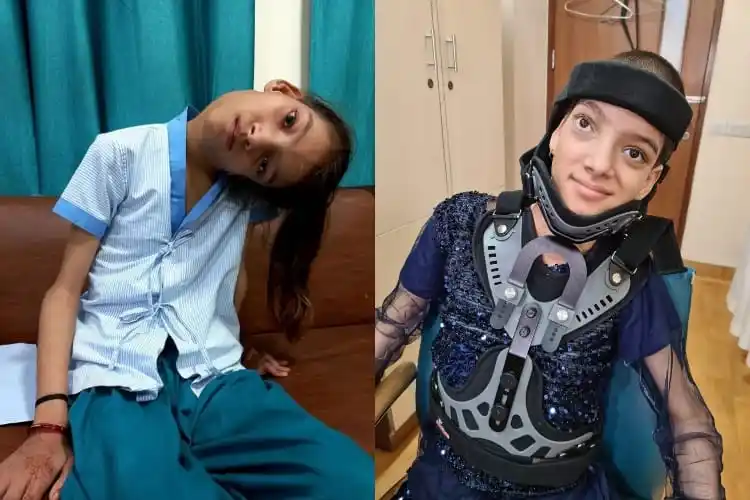
Sabir Hussain/New Delhi
Thirteen-year-old Afsheen Gul from Mithi in Pakistan’s Sindh province has never been to school or played with friends because of a condition that left her neck bent at 90 degrees for most of her life.
The youngest of seven siblings has spent all her life in the family home in Mithi, 300 km east of Karachi. Afsheen who also suffers from cerebral palsy is said to have had a fall when she was less than a year old after which her neck began to bend and over the years it settled at a right angle.
Specialized treatment for Afsheen was beyond the impoverished family’s means. Her father, who was a labourer, died in 2020. But two years before his passing, there was a ray of hope for the family Afsheen’s eldest brother, 27-year-old Mohammad Yakoob Kumbar heard about spine surgeon Dr. Rajagopalan Krishnan at Delhi’s Apollo Hospital who had performed surgery on a teenager from Madhya Pradesh. But the Covid pandemic put paid to any quick medical intervention for Afsheen.
Yakoob, whom Dr. Krishnan describes as a “very devoted brother” remained in touch and eventually landed in New Delhi in November 2021 with his sister.
Dr. Krishnan who earlier had worked for a decade and a half with England’s National Health Service, and is no stranger to extreme cases, had discussed Afsheen’s condition with Yakoob on Skype. But that didn’t prepare him for the severity of the case medically known as Atlanto-axial rotatory dislocation (AARD) when he actually saw Afsheen.
“I don’t think I have seen such a severe case. She had cervical myelopathy which is compression of the spinal cord leading to neurological dysfunction in the upper and lower limbs. There was a risk to life and she is lucky to have survived this long,” Dr. Krishnan told Awaz-The Voice.
“We did a CT scan and spent many hours trying to make sense of it and understand what had happened. It was a combination of a dropped head, skull, and C-1 vertebra dropping 90 degrees on C-2 below which is the trunk. She had everything that made it a high-risk surgery.”
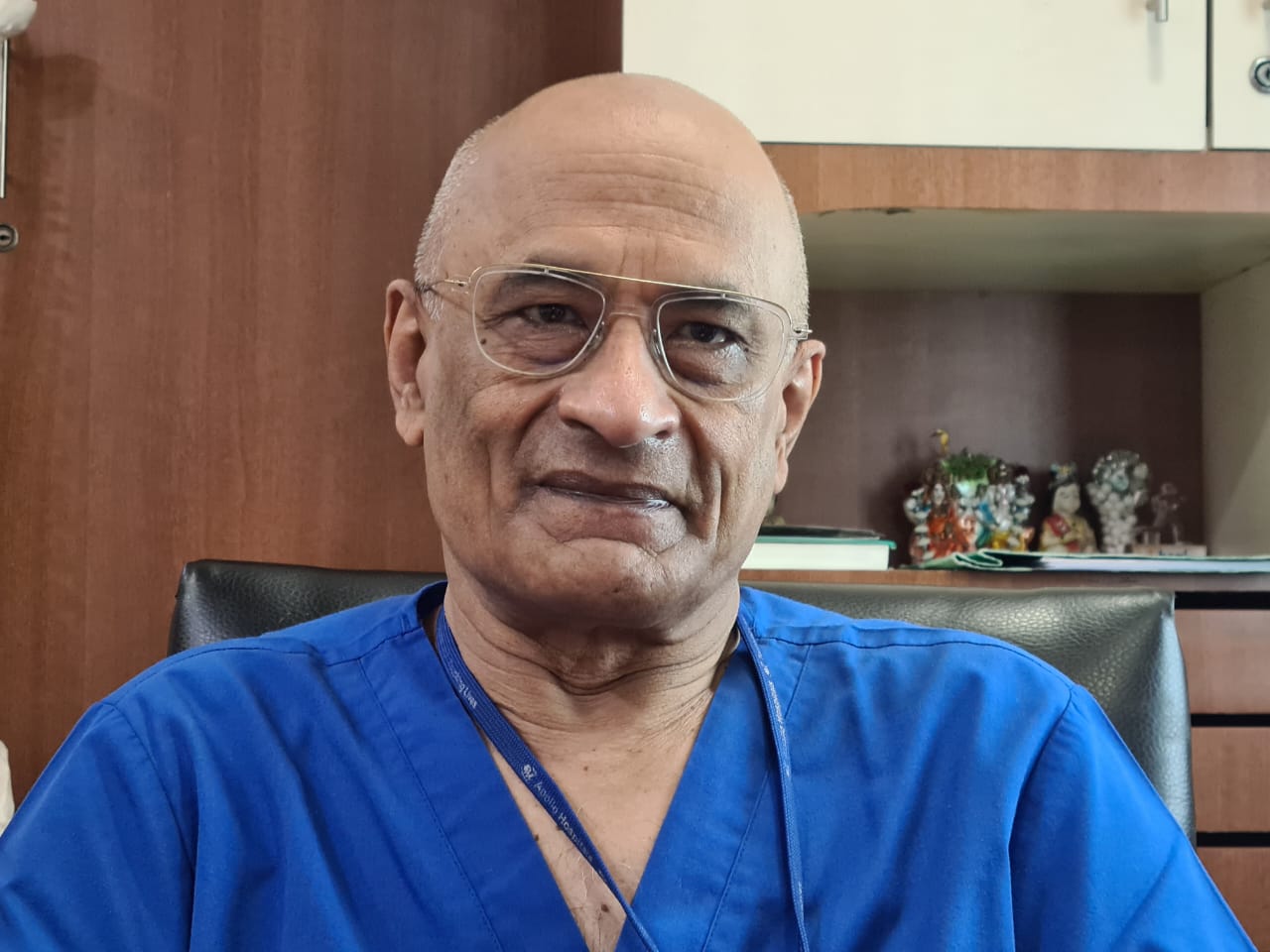
Dr. Rajagopalan Krishnan led the team for the surgery on Afsheen
It was a two-step procedure to straighten Afsheen’s neck. “The first stage was putting her in a Halo-Gravity Traction. It had a ring around her skull with pins holding her head and weights attached to it. When she was lying in bed, weights were attached to a pulley. When she was in a wheelchair, weights were used through an overhead pulley. From 90 degree angle, it had reduced to 60 degrees. The dropped head did not correct as much as I would have wanted. I expected this because in a growing child the bones adapt. So she had bone adaptive changes and I then decided to do a muscle release.”
Afsheen underwent Halo-Gravity Traction towards the end of the year before the main surgery on February 28 that lasted around eight hours.
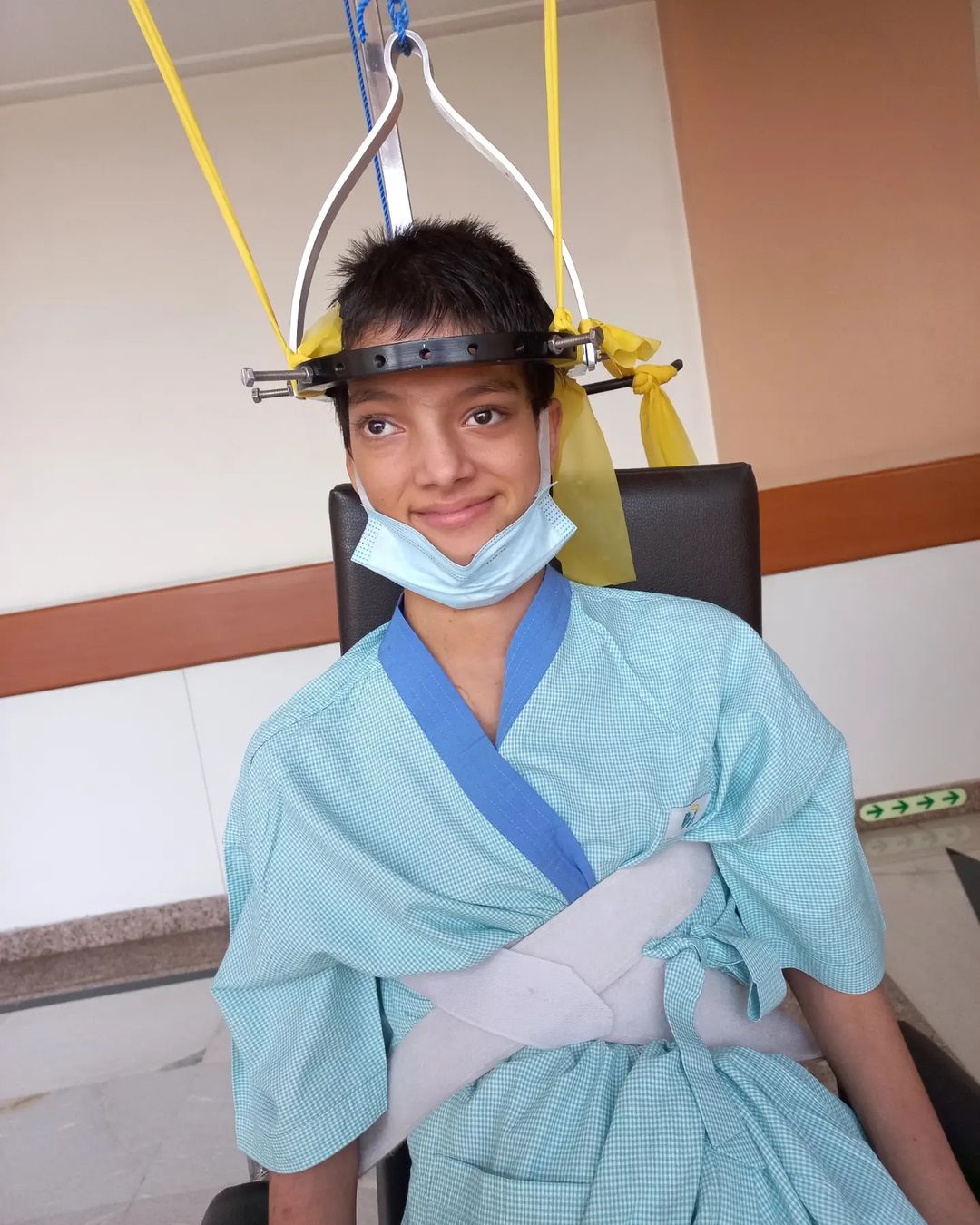 Afsheen in Halo-Gravity Traction
Afsheen in Halo-Gravity Traction
Ahead of the surgery, a conversation with Afsheen’s mother Jameelan fired Dr. Krishnan to take up the challenge head-on.
“I explained to the family that things could go wrong and that Asheen could die during the operation or after it or she could develop other neurological problems. Her mother asked that if she died how will the family get the body? And it was then that I decided that I will do my best to make sure that she doesn’t die on the table. The surgery was not only complex but required extreme caution.”
Dr. Krishnan gives full credit to his team which comprised Dr. Manoj Sharma, orthopedic and spine surgeon, pediatrician Dr. Anita Bakshi “who made it possible to consider the high-risk surgery”, and Dr. Sandeep Vohra, senior CT radiologist.
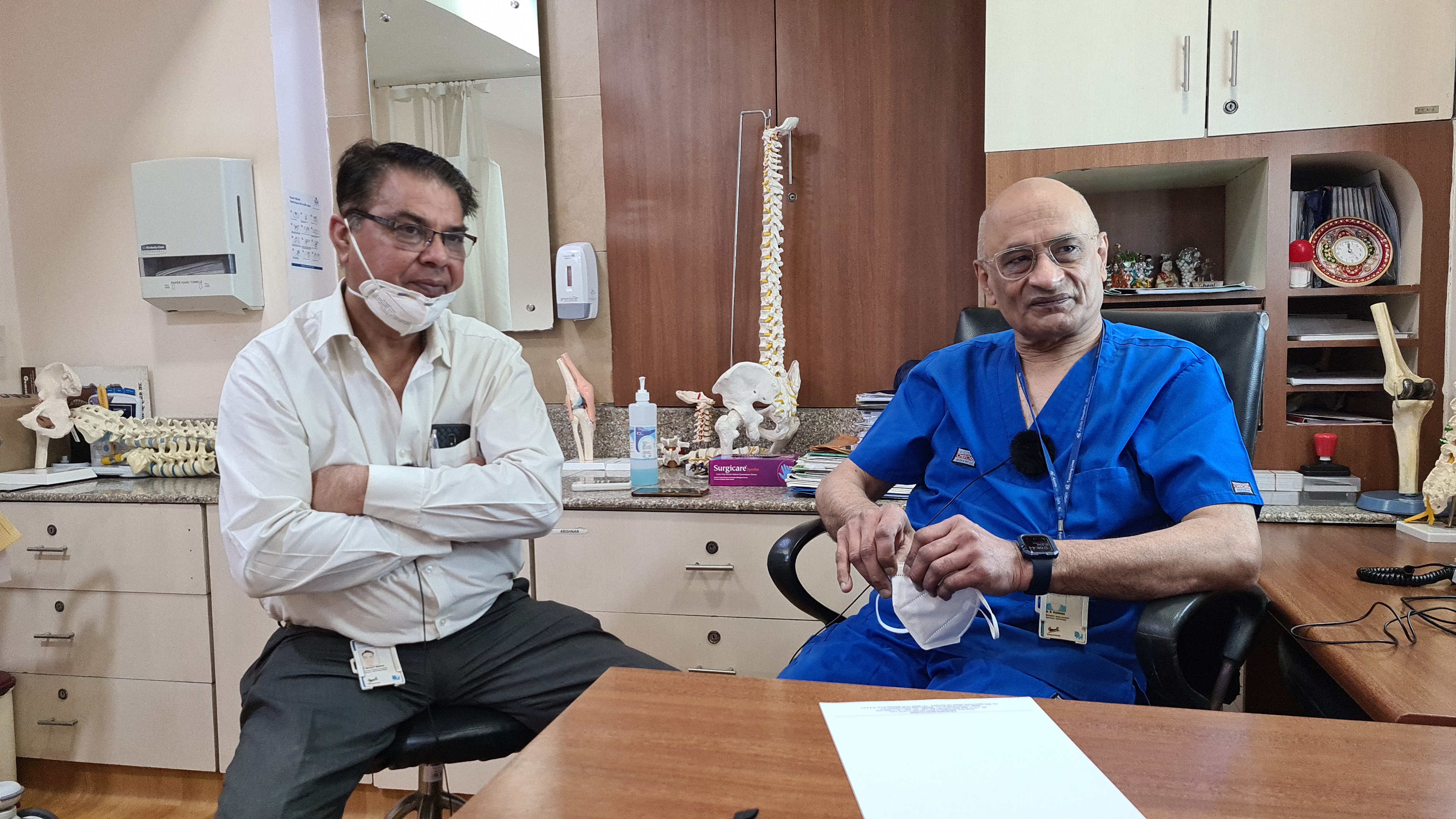
Dr. Manoj Sharma and Dr. Rajagopalan Krishnan
“The aim was to release spinal cord compression. I wasn’t even aiming for complete correction. I didn’t know what would happen. She had only one vertebral artery on the right side. The left artery was either absent or blocked. They supply 20% blood to the brain and the back of the spinal cord. If I damaged it, a fatal outcome was highly likely. We used screws and a rod at the back of the skull and the vertebra to stabilize the neck. Once the neck was stable enough, I removed the C-1 which was digging into the spinal cord.”
“The aim was also to protect life, preserve the spinal cord for now and the future, straighten the head, fix it for now and do a fusion so that it is a permanent straightening of the head. She needs careful monitoring over the next few years so that there is nothing that goes wrong. It is always better to anticipate and pre-empt rather than let something go wrong and then pick up the pieces,” he said.
The operation has been a success and Afsheen now has a straight neck and her life will certainly be less painful. For now, she needs support to walk.
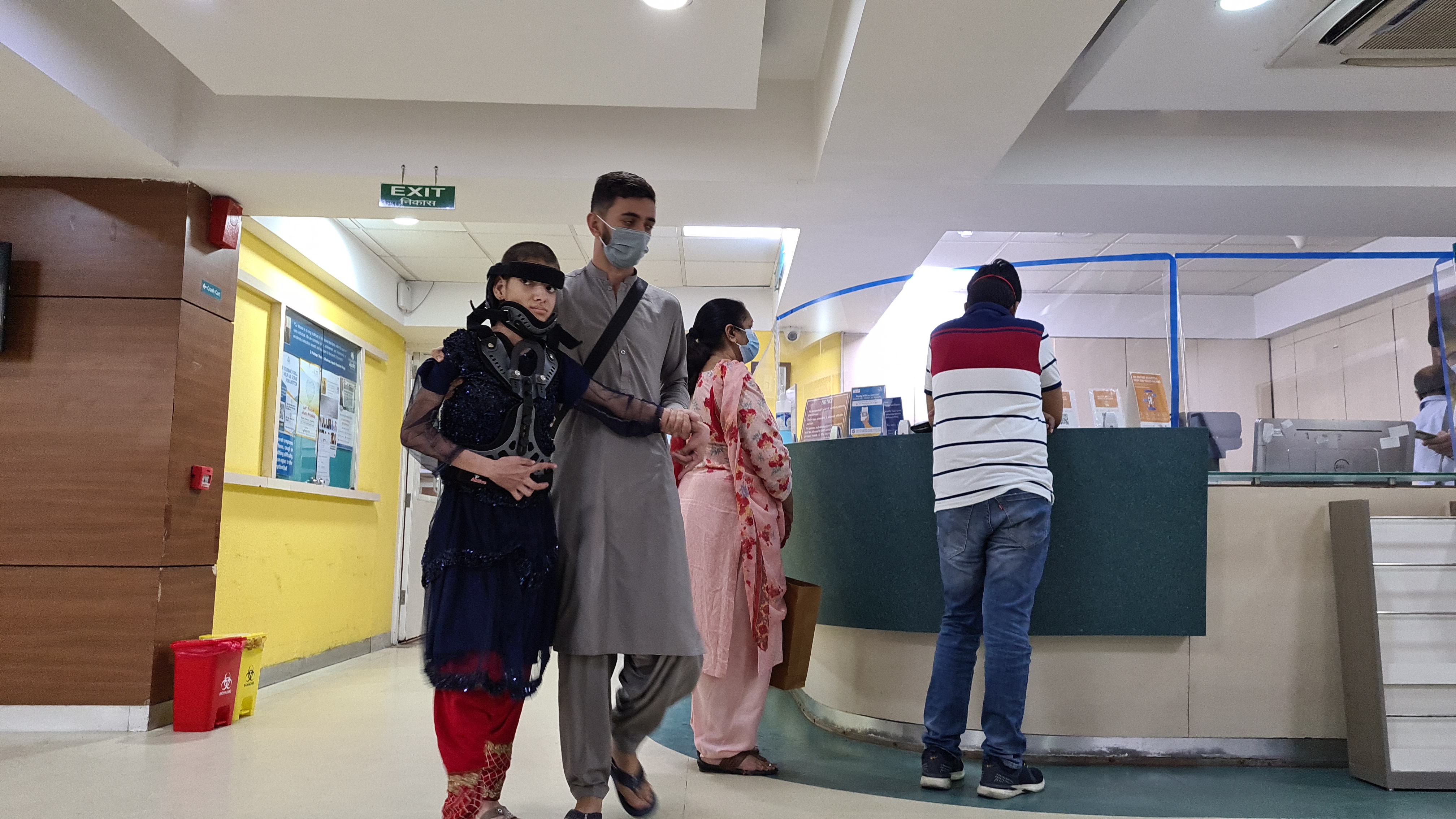
Afsheen and Yakoob at Delhi's Apollo Hospital
“I had to tell Afsheen’s family that she will not be completely normal. She has the brain of a 6 or 7-year-old child because of cerebral palsy. She will stay like that but she won’t die of spinal cord compression in the next 2-3 years. She will stay alive and lead a decent life. She will still need support from the family but she will be looking at the world not upside down but straight on. Functionally, she will be better.”
Dr. Krishnan who will turn 69 in April, says he thrives on challenges and has a soft corner when it comes to children.
“I do like taking up extreme cases. But I am also getting old and I have my own health issues but if children like this come I would like to help them. I don’t care where they come from or what their religion is or whether they are rich or poor.”
Dr. Krishnan performed the surgery free of charge.
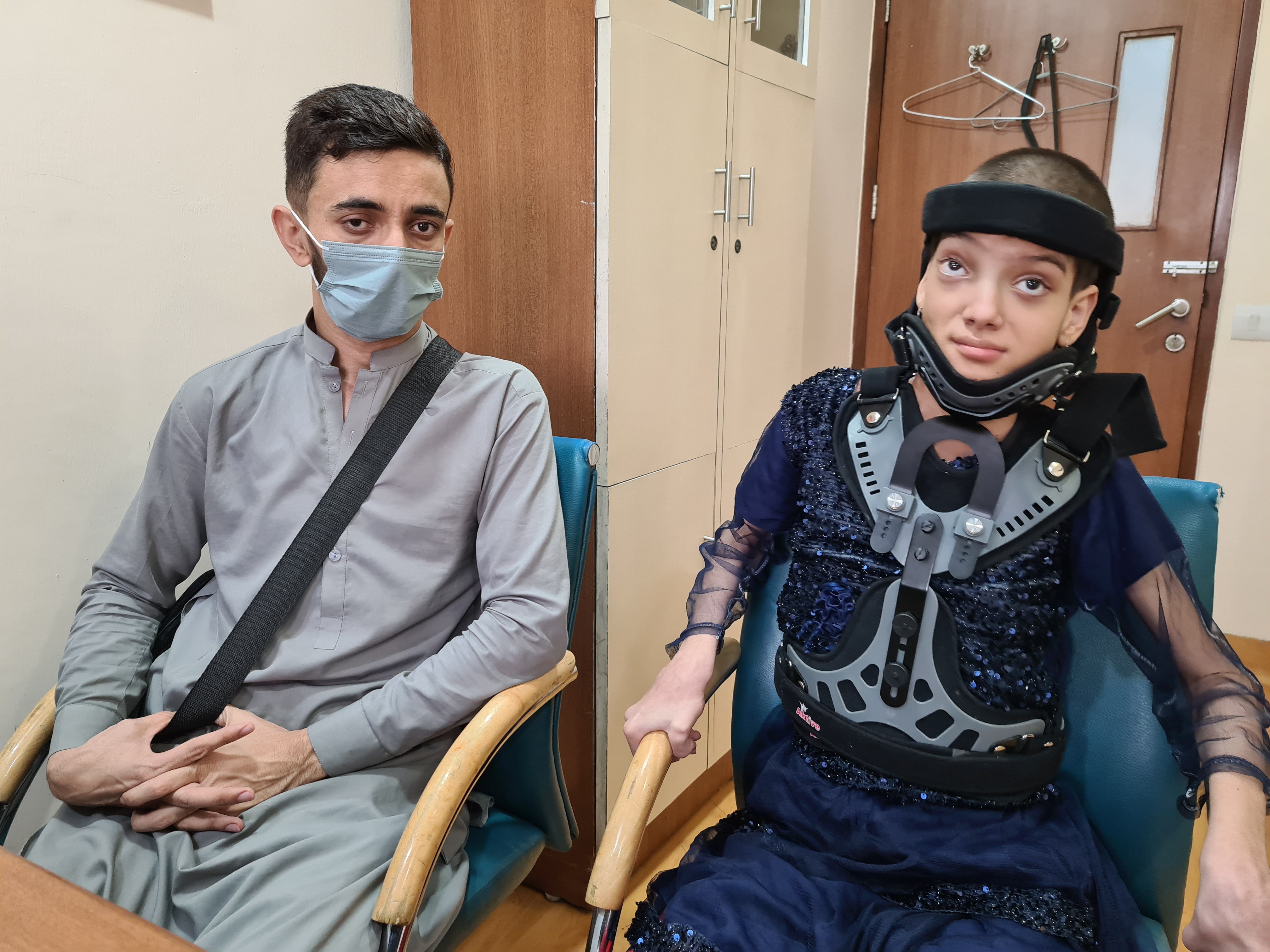
Afsheen in braces after the surgery with her brother Yakoob
Dr. Manoj Sharma said Yakoob’s sense of gratitude towards the team for giving his sister a new lease of life was totally unexpected.
“He touched Dr. Krishnan’s feet in thanksgiving which I thought was very surprising because that’s not the Pakistani culture. He has been a model caregiver to his sister and it was only because of him that we could communicate with Afsheen because she doesn’t speak Hindi,” Dr. Sharma said.
Over the next few months, Dr. Krishnan and his team will monitor Afsheen once a week through Skype. Dr. Sharma said it is unlikely that Afsheen will need to return for any follow-up treatment.
Yakoob works with an NGO that helps raise funds for children like Afsheen. He came to Delhi with his sister because only one person is allowed under a medical visa to accompany a patient. He is effusive about the doctors in particular and Indians in general.
ALSO READ: Weavers of Benaras are one large family
“I saw a documentary about Dr. Krishnan that prompted me to contact him. Afsheen was in very good hands. Dr. Krishnan and Dr. Sharma have simply been great and the rest of the team too. We had no money so we raised funds on GoFundMe through crowdfunding. Most of the $35,000 that the campaign raised for Afsheeen came from outside Pakistan. The hotel where we have been staying has given us discounts on room rent and food,” Yakoob said.
Afsheen and Yakoob will be flying back on March 25. But the Emirates flight will be a long one via Dubai before they land in Karachi and then drive 300 km home for the rest of the family to see the youngest one walking straight.
